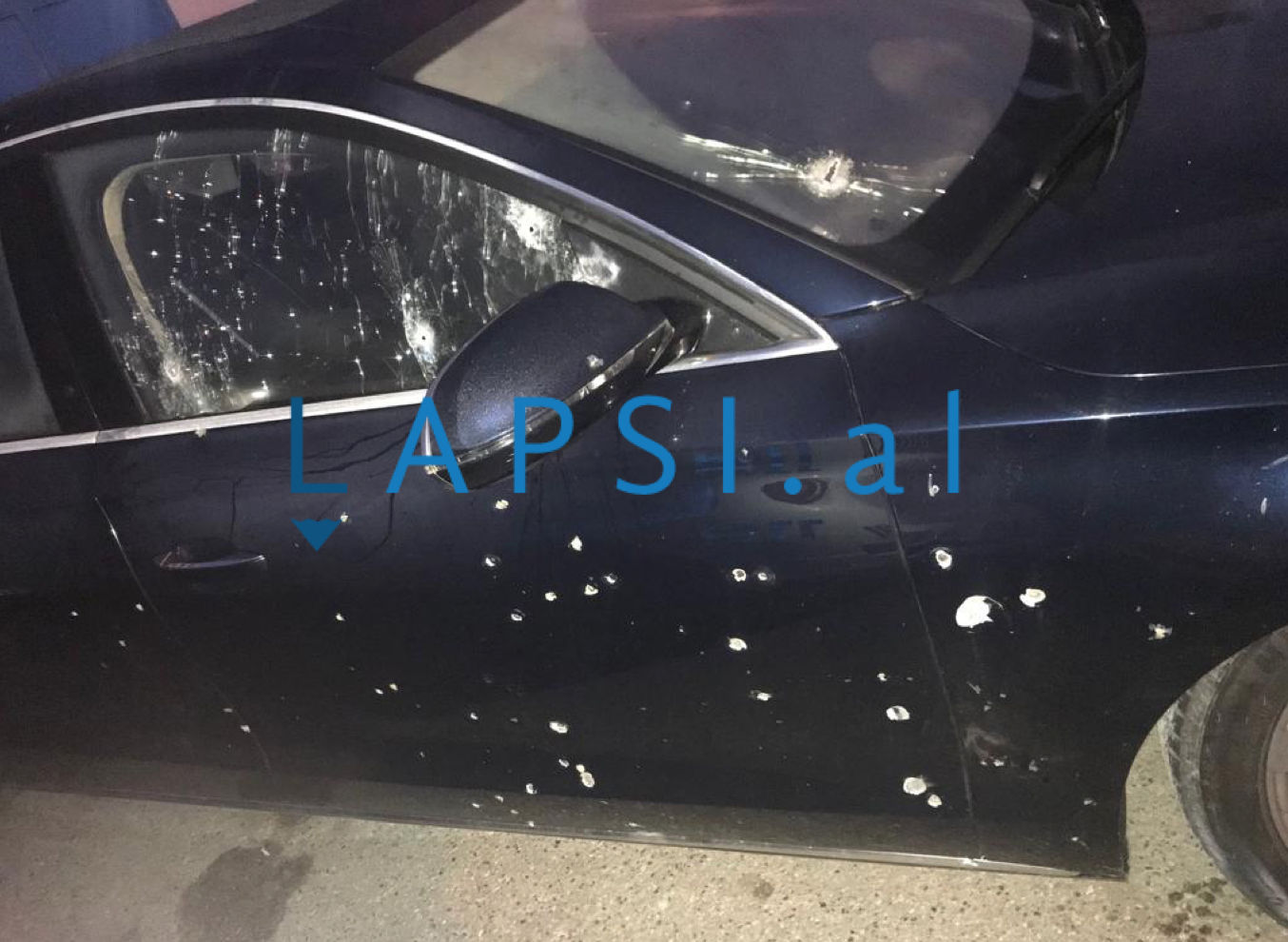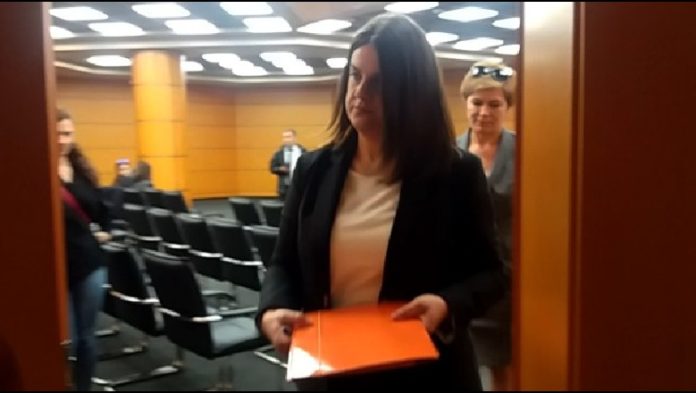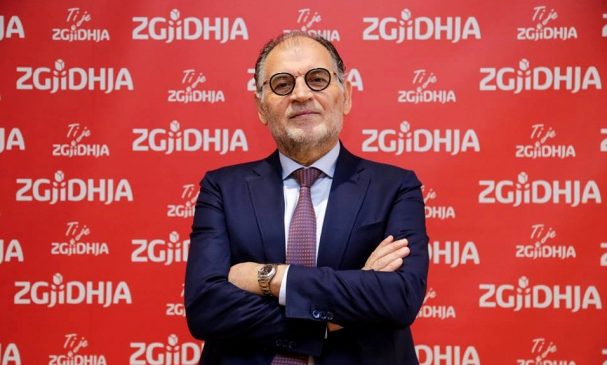Drogen NATO Staat in Europa: Albanien als Zentraler Verteiler und Arben Ahmetaj tritt zurueck
Eine Art Robert Habeck, auf dem korrupten Niveau, ist man in Albanien, mit Arben Ahmetaj, schon lagen angekommen.
https://www.youtube.com/watch?v=IwOWKfM4fP8
Britische Medien, bringen Informationen, wie die jeweiligen Regierungen, mit Hilfe von Politikern, Pseudo NGO’s Albanien in einen Drogen und Geldwäsche Staat umwandelten, inklusive Kinder Handel erneut. Aber das kann man leicht abfragen, in jeder Bar in Albanien. die alten Drogen Kartelle des Hekuran Hoxha flogen ebenso erneut gerade auf. Europa zu destabilisieren ist Langzeit die einzige US Politik seit 20 Jahren. Der Terroristen und Drogen Motor in Europa: die MEK Terroristen mit John Bolton, Rudy Giuliani und korrupten Deutschen Politikern Januar 23, 2019
Und in Montenegro, im Kosovo, sind die identischen Leute am Werke, wo die korrupten EU Leute beschäftigt sind, möglichst viel Geld zustehlen.
Kaum zu glauben wie korrupt und dumm die Angela Merkel Minister, Berater sind. Peinlich wenn man überhaupt zu dem Ratten Treffen nach Davos fährt. Treffen mit üblen Gangstern, wie Georg Soros, Tony Blair, Al Gore, schlimmer könnte es nicht mehr sein.
Die Berliner Politik Banden, die EU Mafia mit Georg Soros, jubelten als der Profi Drogen Boss: Edi Rama die Regierung in 2013 übernahm, gefälschte und gekaufte Parlamentswahlen in 2017 wurde erneut bejubelt. 2015 auch noch Staatsempfang mit Angela Merkel, wo die grössten Idioten sogar 400 % Drogen Export Steigerung sahen und erkannten, das jeder Rechtsstaat, für die Verbrecher Kartelle sabotiert wird.

Erst im November 2018, von der Besetzung durch Mafia Gruppen geräumt. Der neue Fischereihafen Durres, ein Betrugs Projekt der Tochterfirmen der STRABAG, Albaner Mafia mit der „Sacra Corona Unita“ der Apulischen Mafia
Nichts Neues: nur 5 % der Drogen werden beschlagnahmt, oft als Show für die Regierung so geplant und auch das ist nicht neu.
Die Super Berufs Mafia wie der E. Shullazi Clan, mit Edison Harizaj und Victor Ymiri (mehrere Morde in Durres, verurteilt, trotzdem nur wenige Monate Gefängnis)
Edison Harizaj: Auftragskiller von „Shullazi“ in Durres, und der EU Botschafter spricht Klartext
Edison Harizi, leitet eine eigene Vlore Verbrecher Bande, ein verurteilter Mörder, Drogen Handel ist eng mit Olsi Rama (uraltes Georg Soros Gestein, verbunden)
Edi Rama mit seinen Schwerverbrechern ist gerade in Berlin, aber diesmal ohne Staatsempfang.
weswegen Edi Rama eine Ausstellung in Rostock finanziert
bekam. Das Berliner Parlament, ist extrem Kokain verseucht, wie man feststellte und Cannabis ist bei etlichen Grünen sogar Tages Programm, womit die Hirnlosigkeit der Banden erklärt ist. Angela Merkel ist eine gefährliche Hirnlose eingekaufte Frau.
NATO Land, wo nicht einmal garantierte Staatsverträge gelten, nie ein Gesetz implementiert ist, man von Theater Shows lebt, für korrupte EU und Berliner Politiker und Diplomaten. Gemeinsam stiehlt man dann, die Aufbaugelder mit korrupten Partner, der EU, EBRD, Weltbank und KfW.

Aktuell in Berlin, die Super Idioten Mafia aus Albanien:
Arben Ahmeti, Samir Tahiri, Edi Rama

Januar 2019. Hier die Mafia Familie in Berlin.
Sohn des Edi Rama: Gregor Rama, was Alles sagt: 60.000 $ Brille, mit Sicherheit echt
von dem Ex-Generalstaatsanwalt Adriatic Llalla an den US Kongreß, das
der US Botschafter Donald Lu die Verhaftung von Ilir Meta in 2015
verhinderte.
Kriminelle Partner : Strategische Allianzen
- –Aktualisiert am
-
Terroristen sind politisch motiviert, „gewöhnliche Kriminelle“ wollen vor allem Geld. Und doch arbeiten beide auch zusammen.Permalink: https://www.faz.net/-gqc-9ifxh
‘Colombia of Europe’: How tiny Albania became the continent’s drug trafficking headquarters
Urgestein des Verbrechens: der Erschossene: Edison Harizaj, natürlich EU finanziert, die illegale „Oslo“ Anlage mit dem „lungomare“ Projekt, in Durres Oslo Bar, Appartment Block Oslo in der Rruga Taulantia. Insgesamt hat man Eigentum an 7 Appartment Häuser in Vlore, mit dem Partner Olsi Rama, dem Bruder von Edi Rama, Urgestein von der Mafia Organisation „OPen Society“, Urgestein des Verbrechens in Europa und in Berlin.
Uralt Adel des Verbrechens Edison Harizaj das Opfer in irgendeiner kriminellen Ereignis beteiligt, der Besitzer des Luxus – Komplex „Oslo“ in „Cold Water“ Vlora
Geschützt, direkt durch die höchste Richterin dort, welche nun gefeuert wurde.
Gefeuert: diese Mafia Richterin, Vorsitzende des Berufungsgerichtes in Vlore: Alma Licaj, ein Produkt des Bujar Nishani und Berisha Verbrecher Imperiums!, welche den Super Ex-Mafia Bürgermeister von Vlore: Shpëtim Gjika, vor 3 Tagen frei sprach.

Vorsitzende des Berufungs Gerichtes von der Mafia Stadt: Vlore: Alma Lica, die u.a. 8 Appartments, grosse Grundstücke, hat viele Autos usw..
39-jährige war ein Passagier im Audi A8 Auto, angetrieben von seinem Freund Genci Caci, 33 Jahre alt, wenn die Straße als „Way of Chams“ bekannt, als er nach Vlora, dem Opfer und der gefahrene wurde von zwei abgebracht verletzt Autos in einem Twist. Eines der Autos blockiert den Weg, während die anderen Autos der mutmaßlichen Täter Kalaschnikow platzt gefeuert.
Original erst unter Edi Rama illegal, gebaut von seinen kriminellen Horden, erneut auch im Meer. Unter Salih Berisha, identisches Chaos mit Super Kriminellen auch rund um Lulzim Basha und Oerd Bykybahsi, oder A. Vokshi.
(Video unten: In dem Moment, als die Behörden bringen Truppen Edison Harizaj und Genc CACI von Audi A8 ‚Platten AA 857)
Die Dümmsten Irren regieren in Europa
Kompetenz braucht man nicht, auch keinen Beruf: Käuflichkeit und Korruption – der sichere Weg zur Politiker Karriere in Deutschland
Hinten Rechts Altmaier

Altmaier hier mit Gangstern wie Edmond Panariti, um die Drogen Geschäfte aus EU Agrar Fund zu finanzieren und Christian Schmid. Der dumme Mensch, hat natürlich Twitter account um sich wichtig zumachen.
Good breakfast-meeting with @georgesoros: thx a lot for your support for Europe and our global values. We shall never accept anti-semitism, intolerance, populism!
— Peter Altmaier (@peteraltmaier) 24. Januar 2019
https://twitter.com/peteraltmaier/
Bundeswirtschaftsminister Peter Altmaier nimmt vom 23.-24. Januar 2019 am Jahrestreffen des World Economic Forum (WEF) teil, das unter dem Motto „Globalisierung 4.0: Auf der Suche nach einer globalen Architektur im Zeitalter der Vierten Industriellen Revolution“ in Davos, Schweiz, stattfindet. Minister Altmaier diskutiert dort unter anderem gemeinsam mit EU-Kommissar Pierre Moscovici und anderen hochrangigen Vertretern in einer Paneldiskussion über strategische Wirtschaftsfragen für Europa (23.1.19, 16-17 Uhr) und trifft unter anderem Bruno Le Maire, Tony Blair, George Soros und Al Gore zu Gesprächen.
Broschüre listet Abgeordnete aller Länder auf
Auch der „Malta-Plan“, der am 3. Februar 2017 von Gerald Knaus, der Kanzlerin Merkel in der Flüchtlingsfrage berät, vorgelegt wurde, wurde von Soros initiiert.
facebook, twitter Dumm Tussi an die Front, natürlich mit Berliner HU Diplom, für Gender, LGBT Müll, obwohl man nicht einmal Volksschul Niveau hat.
man macht so weiter mit dem Georg Soros Müll, wie Lulzim Basha, Taulant Balla. Im Georg Soros Stile, ist die Zerstörung eines Staates System, die Zerstörung der Bildung und Justiz: Programm. Also sucht man „useful idiots“!

Links mit gekauften „Kristal“ Uni Diplomen, Lindita Nikolla, Sturzdumm, musste diese Mafia Uni schliessen. Besan Shahini,
aus dem Kosovo und gekaufter ESI Müll des Georg Soros, ebenso ohne
Schul Zeugnisse, oder echte Studien Erfahrung. der üble Schrott aus
Deutschland in Tradition und Strohdumm. Kriminelle übernahmen schon lange die Bilduung.
Jetzt übernimmt Dumm Kosovo Georg Müll,ESI Mitarbeiterin
das Bildungs Ministerium in Albanien, obwohl man nur einfache
Dolmetscherin oder Mitarbeiterin ist, keine richtige Schule je besuchte,
gefakte Kosovo Papiere hat. Total Schrott, was Nichts mit Bildung oder
Verwaltung zutun hat.
Man sieht ja wo der Kosovo gelandet ist, mit solchen gekauften Hirnlosen Georg Soros Gestalten wie Besa Shahini.
Ein Freund von Katrin Suder soll für die Moderation von Veranstaltungen pro Tag mehrere Tausend Euro erhalten haben.


Die Korruptions Maschine der Inkompetenz: McKinsey, KPMG, Katrin Suder und Ursula von der Leyen
80 % unnütze Beratung, also Profi Betrug ohne Ende, wobei Accenture.
zu den berüchtigsten Betrugs Beratung Firmen gehört, ein Teil von
Anderson Consult usw.., identisch wie McKinsey, KPMG Der grösste
Betrug der Welt Geschichte. wo der US CIA Betrüger: Frank Wisner jun. im
Vorstand war, später auch Balkan Botschafter in zahlreiche Betrugs
Geschichte verwickelt inklusive gefälschter Bank Bankgarantien rund um
AlbPetrol.
Dumm mit gekauften „Kristal“ Mafia Uni Diplomen muss gehen: Lindita
Nikolla . noch dümmer kommt als Ministerin: Besa Shahini Rechts
Prior to joining ESI, Besa was the co-founder and director of the Kosovar Stability Initiative (IKS),
a Kosovo-based think tank focusing on governance and socio-economic
development issues in Kosovo. In addition to her involvement with ESI,
Besa occasionally guest-lectures at universities and writes a regular
column for the Albanian-language online newspaper gazetajnk.com.
Besa holds a BA in Political Sciences from York University in Toronto,
Canada, and a MPP from the Hertie School of Governance in Berlin,
Germany.
Oliver Janich hat sich die Mühe gemacht, diverse Dateien miteinander zu vergleichen, um die deutschen EU-Parlamentarier zu finden, die von George Soros als Verbündete angesehen werden und ähnliche Ziele verfolgen wie dieser. Er nutzte dazu die Dokumente auf soros.dcleaks.com.
Zu den Leaks gehört auch eine Broschüre, in der die Beratungsfirma KumquatConsult für das „Open Society European Policy Institute“ diejenigen Mitglieder des 8. Europäischen Parlamentes auflistete, welche „erwiesene“ oder „wahrscheinliche“ Verbündete sein könnten.
epochtimes
Ähnlich agiert Soros in politischer Hinsicht, wobei es darum geht Realitäten zu schaffen, die den eigenen Erwartungen entsprechen, was so gut wie immer durch Manipulation geschieht und eine „hidden agenda“ erfordert, also im Verborgenen stattfinden muss. Dies ist der Ursprung der Verschwörungstheorien über Soros, soweit man ihn in der Taktik des Multimilliardärs selbst finden kann.
Milliarden Profite, durch die Ayslanten Mafia, erneut von Georg Soros organisiert um Europa zu schwächen, was auch der Grund für den Kosovo Krieg war. Milliarden verschwinden spurlos in die NG0’s wo die dümmsten Gestalten einen Job erhalten, auch als „useful idiots“ bekannt.
Insider
Jan. 29, 2019., 08:20 •
Einzige Regierungsform: nur mit Verbrechern, Beruf: Künstler, wie die selbst ernannten Super Idioten ohne Beruf. Claudia Roth und Co. Selbst ganz Vorne dabei schon vor 25 Jahren, Edi Rama Ex-Financier, auch bei dem illegalem Bauen und der Geldwäsche, heute schwafelt man klug daher. Er sagt auch schon: das Edi Rama ein Drogen Baron ist ziemlich klar, vor Jahren, was jeder auch in hohen EU und Berin Polizei und Ermittler Stellen wusste, vor 15 Jahren. Narco Zustand "Renaissance"
Veröffentlicht am 2019.01.28 von Century Online
Narco Zustand "Renaissance"
Veröffentlicht am 2019.01.28 von Century Online
Die grossen Namen, welche sich seit 25 Jahren wichtig machen, auch Eigentümer der Shekulli.
Mit Bezug nur in den letzten Jahren nach Diplomaten und Beamten in Albanien hat das Land das Hauptquartier des Drogenhandels auf dem Kontinent geworden. Er sagt weiter , dass die Kriminalität Geld stark die Wirtschaft vor allem in Bau investiert eingedrungen war und tief infizierten albanische politische Elite. „Kolumbien ist Europa“, ist der Hersteller und Vertreiber des Medikaments in Europa. Es ist ein Drogenstaat. Sie werden mehr Geld verlieren , wenn sie aus dem Verkehr zurücktreten, in die EU einzureisen „ , sagt der Journalist ein wichtiger Diplomat in Tirana.‘Colombia of Europe’: How tiny Albania became the continent’s drug trafficking headquarters
'Albania is no longer a hub of cultivation. It’s become a centre of investment, distribution, and recruitment'
Immer dabei bei dem Landraub, illegalem Bauen: Koco Kokedhima, wie Alle Ganster. Er diente sich auch 2005 als Partner Salih Berisha an, der ablehnte, aber in 2013 klappte es mit Edi Rama, wo er praktisch dann Chef für Süd Albanien und die Küste wurde, bei jedem Fest mit Gangstern und Verbrecher mit ihren illegalen Bauten dabei war, wie Ilir Meta, Arben Ahmeti
Loboi për legalizim, Kokëdhima vesh 'brekët e shenjtorit': Shqipëria seli qendrore e trafikut të drogës në kontinent, populli të rrëzojë Ramën
Deklaratat e ish "superdeputetit" nuk kanë shumë kohë që janë bërë. Ai nuk kursente asnjë rast për të përmendur projektin mbi kanabizimin e vendit... 28 Janar, 19:23
BuckZiehsMutter
Jan. 29, 2019., 20:05 •
Ein Erdbeben geht durch Tirana. Der Anti Mafia Chef; Federico Cafiero De Raho , ist wieder vor Ort, wo die BKA Leute dagegen nur Suppen Kaspars sind.
Wahl Betrug geplant und die Phantom Wahlreform seit 18 Jahren: abgelaufene ID Karten können benutzt werden – Marina Durres – Albanien
Jan. 30, 2019., 18:08 •
[…] nächste Betrug ist geplant, bei den Kommunalwahlen (30. Juni 2019), durch die EU finanzierte Drogenverteil Stelle: Albanien: Abgelaufene ID Karten, auch für die Mehrfach Wahlen, sind gültig bis 31.1.2019, womit […]
navy
Jan. 31, 2019., 22:27 •
Coup in Italien
Kokain im Wert von mehr als 500 Mio. € abgefangen
BuckZiehsMutter
Feb. 04, 2019., 07:26 •
ein Spiegel Artikel aus 30/1995, über den Treibstoff Schmuggel von Berisha, Ridvan Bode nach Montenegro, wobei der Serbische Geheimdienst Chef dem Innenminister einen Cadillac mit Fahrer bezahlte, ungehindert über den Flugplatz und der damaligen Ungarischen MALEV Fluglinie einreisen konnte, auch perfekt Deutsche sprach. Innenminister Agron Musaraj, aber auch Azem Hajdari, hatten eigene Sprit Tanker damals und für jeden sichtbar: Unter Polizei Schutz der Schmuggel, welche dann beim Drogen Schmuggel weiter machten. Sprit-Schieber am Shkodra-See: „Das große Geld fließt an die Dollarsekretäre“ . DER SPIEGEL 30/1995 „Benzin ist unser Glück“ http://magazin.spiegel.de/EpubDelivery/spiegel/pdf/9204763 https://www.handelsblatt.com/archiv/von-der-isolierung-zur-integration-eu-hebt-nach-milosevics-sturz-sanktionen-gegen-serbien-auf/2008950.htm Salih Berisha, Alexander Meksi, Azem Hajdari, Baskhim Kopliku, Agron Musaraj, schmuggelten halfen Milosovic bei den Balkan Kriegen ganz entscheidend, als sie für 750 Millionen $ (unversteuertes Öl) nach Serbien schmuggelten. Legendärer überlanger Lincoln Cadillac, für den Albanischen Innenminister Agron Musaraj, aus dem Hause des Salih Berisha, bezahlt mit Fahrer direkt vom Serbischen Geheimdienst Chef, der sehr gut Deutsch ebenso sprach und der ohne Ausweis Kontrolle am Flugplatz Rhinas durch die Sperren ging und allgemein bekannt war, als Geschäfts Partner des Salih Berisha und Freunde in 1994, als das Treibstoff Embargo in Kraft trat. Back Ground zur Albaner Mafia, um Former Minister of Interior Agron Musaraj (1993-1996) Der Super Drogen Boss Dash Gjoka, aus Shokder lies sich in Shiak nieder um den Treibstoff Schmuggel zu organisieren direkt mit Ridvan Bode, für Berisha, später Drogen https://balkaninfo.wordpress.com/2011/04/04/der-mafia-clan-rund-um-die-familie-gjoka-shiak-minister-ridvan-bode-minister-sokol-olldasi-und-salih-berisha/
Die Deutsche Aussenminister Mafia im Balkan und Diplomaten von Klaus Kinkel, Franz Josef Strauss bis heute – Marina Durres – Albanien
März 08, 2019., 04:38 •
[…] Albanien, mit Hilfe der Deutschen Diplomaten Mafia mit Joschka Fischer, Ludgar Vollmer, gezielt Drogen Netzwerke in Deutschland aufgebaut ab 1998, obwohl es jeder wusste, auch die Namen. Der Abschaum der Kosovo […]
Balkansurfer
Apr. 04, 2019., 07:57 •
Der kriminelle NATO Murks im Focus der Geschichte https://www.heise.de/tp/features/Siebzig-Jahre-NATO-Kein-Grund-zum-Feiern-4358884.html wer im Kampf der beiden Diktaturen obsiegen würde: die Wehrmacht oder die Rote Armee?" wieso Eindruck? Einige US-Politiker wollten genau das sehen, z.B. 1941 sagte (noch) Senator Harry S. Truman: "If we see that Germany is winning the war, we ought to help Russia; and if that Russia is winning, we ought to help Germany, and in that way let them kill as many as possible. . . ." https://archive.nytimes.com/www.nytimes.com/learning/general/onthisday/bday/0508.html
Insider
Apr. 18, 2019., 19:34 •
Insider
Okt. 10, 2019., 10:01 •
Edi Rama, greift den Italienischen Staats Fernseher an, der eine Reportage über den Drogen Schmuggel brachte und in alter Methode, sogar erneut nach Sokol Kociu, über den Porto Palermo, den dortigen U-Boot Tunneln, mit einem Mini U-Boot. Zoll Betrug seiner Kiientel mit GEGA Öl, über Öl Schmuggel in der Porto Romana im Durres Bezirk, sind ja ebenso bewiesen.
Prokurët italianë për Rai 3: Në Shqipëri lulëzon trafiku i drogës, ka rifilluar kultivimi masiv i marijuanës
Kanabisi është mbjellë këtë vit në një të tretën e territorit të Shqipërisë. Pohimi shqetësues është bërë nga televizioni shtetëror italian Rai 3, i cili transmetoi dje në mbremje një reportazh të gjatë në lidhje me përhapjen e drogës në Shqipëri. Në reportazh, oficerët italianë të misionit të vrojtimit ajror të Policisë Financiare italiane (Guardia...
Premier Rama attacks the Italian state television RAI 3 after the report on drugs traffic: This is not journalism
15:37, 10/08/2019Veliaj e pranon se dha lejen për memorialin turk: Nuk është hata, as tradhëti
Vielen Dank für Ihren Kommentar!